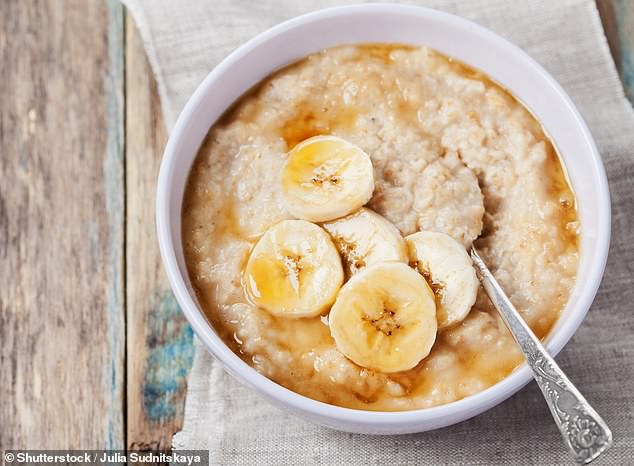A hearty bowl of porridge may sound like a healthy way to start the day, but under new Government guidelines it’s classed as junk food — although it depends which type you choose.
The Government’s new ultra-strict ban on junk food advertising has sparked outrage on social media, with many rallying against the ‘confusing’ rules that list foods like porridge, muesli and some yoghurts as unhealthy.
These products will be banned from commercials that air before 9pm on television, and axed online ads completely.
But if the foods we considered to be a healthy start to the day are not, what should we choose instead?
Rob Hobson, registered nutritionist and author of ‘Unprocess Your Family Life’, strongly disagrees with claims porridge is an unhealthy breakfast choice.
‘It is a source of protein and fibre which is what you want from a breakfast,’ Mr Hobson told MailOnline.
However, not all porridge is created equal and some varieties contain a lot of added sugar.
He explained that it’s not plain rolled oats that are the problem, but instant porridge pots and sachets that are sweetened with added sugar.

Instead of eating instant pots, Mr Hobson suggests people opt for making their own oats with milk and topping it with some chopped fruit or dried fruit or some nuts and seeds for a healthy breakfast
Instant pots contain oat flakes, milk powder, sugar and added flavourings like freeze dried berries can contain as much as 13g of sugar (three teaspoons) in a 55g pot.
NHS guidance states the average adult should have no more than 30g or seven teaspoons of added sugar per day.
This is both due to the risks of tooth decay and the fact sugary foods are unlikely to keep you full for long, leading to hunger pangs between meals.
Instead of eating instant pots, Mr Hobson suggested making your own cooked oats with milk and topping it with some freshly chopped fruit for sweetness.
But he warns that we should check the labels for sugar contents on products such as ready made Bircher muesli and granola pots sold in cafes.
‘If you are buying it out definitely check the label for the sugar content and the ingredients,’ Mr Hobson warns.
One pot of Bircher Museli at Pret contains 343 calories and a whopping 34.9g of sugars. Similarly, a Greek Style Yoghurt with Mixed Berry Compote at Costa is 249 calories and contains 20g of sugars.
Mr Hobson puts their high sugar content down to syrups and the sweet granola that’s sprinkled on top.

Rob Hobson, registered nutritionist and author of ‘Unprocess Your Family Life’, says breakfast is a good opportunity to get lots of fibre in your diet
However, when you make it at home you can be in control of how much sugar you are adding.
‘If you’re making Bircher muesli at home, you’re only going to use a bit of apple juice, milk, yogurt, oats and a bit of cinnamon. So you can really control what you’re doing,’ he said.
Other products in the cereal aisle that fall under the ban include some oat-based granolas.
Granola is often assumed to be healthy, but in fact many products contain dried fruit, honey and even chocolate, which can ramp up the sugar count, Mr Hobson said.
Children’s cereals are quite-rightly banned too: products in brightly coloured packaging are also often high in sugar.
For example, popular Frosties contains almost three teaspoons of sugar per 30g bowl.
As for other examples of what you should be eating, Mr Hobson described eggs as the ‘ultimate breakfast food’.
He said: ‘They are a source of protein that can help to keep you full. They’re also a source of nearly all of the micronutrients that you need.’
Pairing eggs with wholemeal toast would be the best choice for a boost of fibre, which has been shown to reduce the risk of bowel cancer, he concluded.
However, if you are not a fan of eggs or usually crave a sweet breakfast in the morning, yoghurt and fruit also ticks the boxes of what makes a healthy breakfast.
Mr Hobson suggested eating Greek yoghurt topped with berries for added sweetness, as well as perhaps some seeds and nuts for extra fibre.
Here, you will be getting protein from the yoghurt that will keep you full until lunchtime.
But in other cultures breakfast is seen as more of a main meal with rice, vegetables and fermented foods as the go to options over sugary cereal and toast.
Mr Hobson explains that in India people may eat a curry with rice and lentils and in Japan rice with fermented soybeans and an egg — they are also more likely to add vegetables.
Even though these rice-based breakfasts still give you carbohydrates and protein like popular British options, adding vegetables and fermented food is a great way of getting extra nutrients in your breakfasts, Mr Hobson explains.
This article was originally published by a www.dailymail.co.uk . Read the Original article here. .


